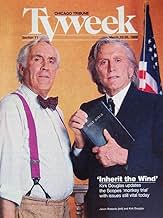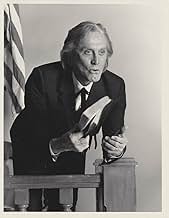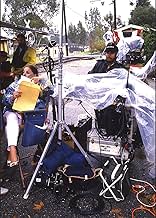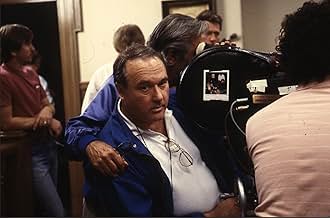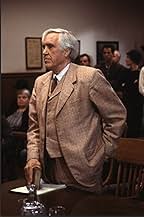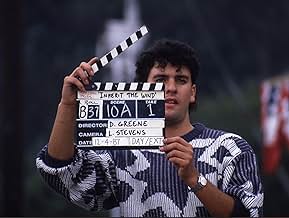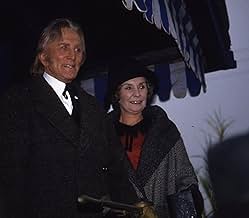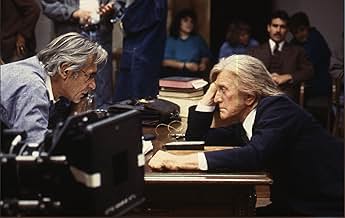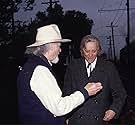Ajouter une intrigue dans votre langueA biblical orator opposes a liberal lawyer defending a man for teaching Darwinism in the 1920s South.A biblical orator opposes a liberal lawyer defending a man for teaching Darwinism in the 1920s South.A biblical orator opposes a liberal lawyer defending a man for teaching Darwinism in the 1920s South.
- Réalisation
- Scénario
- Casting principal
- Récompensé par 2 Primetime Emmys
- 2 victoires et 1 nomination au total
- Bailiff
- (as Thom McCleister)
- Radio Newsman
- (as Richard Gilbert Hill)
Avis à la une
This was that film. I saw it when it was first aired when I was 14 and it made an impression on me. We had read the play a year earlier in 7th grade but it was Jason Robard's portrayal of the playfully witty grumpy grandpa who made the movie.
If you like Robards this movie cannot be missed. His portrayal of an ideal Atheist is good, even if it the reality of Clarence Darrow's personality. The way he gives sage advise to Cates about "Golden Dancer" - "Bert, whenever you see something bright, shining, perfect-seeming—all gold, with purple spots—look behind the paint! And if it's a lie—show it up for what it really is!" - cannot be beat. Robard's perfect rendition of this epic metaphor for a young man to follow in his hard and often lonely search for truth is what makes this film.
As an adult now, I have seen the classic version of this but there are benefits to this old made for TV movie - if you can find it, see it - and also drop me a line about where I can find it - I had my old VHS for years but can't find it!
And where the old black and white version suggested the oppressive heat and humidity of Dayton, Tennessee, this one didn't even come close. Darren McGavin who played H. L. Mencken was quite good though and easily erased the memory of Gene Kelly in the original. And I've always adored Jean Simmons in most of what she did. Kyle Secor was the Scopes character (I mistook him for Matthew Broderick) and was very adequate.
I'd be interested to see (again?) the 1965 TV version with Melvyn Douglas and Ed Begley but I don't remember it at all if I did see it.
(1) 1960 theatrical film starring Fredric March and Spencer Tracy.
(2) 1965 made for TV film starring Ed Begley and Melvyn Douglas.
(3) 1988 made for TV film starring Kirk Douglas and Jason Robards.
(4) 1999 made for TV film starring George C. Scott and Jack Lemmon.
Something very interesting happens when these four versions are considered as one body of work. Let me explain. For simplicity, I'll refer to each version by its indicated number.
Item: Three of the eight actors who played leading roles in the four versions of IW also played the identical leading roles in either a theatrical or TV film version of Dr. Jekyll and Mr. Hyde. They are Fredric March (1), Spencer Tracy (1) and Kirk Douglas (3).
Item: Two actors who had principal roles in one version of IW also appeared in Days of Wine and Roses. The man starred in the theatrical movie version, and the woman originated the female leading role in the earlier TV version. They are Jack Lemmon (4) and Piper Laurie (4).
Item: Two actors who had principal roles in one version of IW also appeared as co-stars in the film Spartacus. They are Kirk Douglas (3) and Jean Simmons (3).
Item: Two actors who had principal roles in one version of IW also appeared as co-stars in the film The Hustler. They are George C. Scott (4) and Piper Laurie (4).
Item: Two actors who had principal roles in two different versions of IW also appeared as co-stars in the film The Hustler. They are George C. Scott (4) and Murray Hamilton (2).
Coincidence? Of course. But interesting? You bet!
Le saviez-vous
- AnecdotesThe real William Jennings Bryan ran for President three times: 1896, 1900, and 1908. Bryan was the first Presidential candidate to extensively barnstorm during a Presidential campaign in an era when most candidates did not. Although it's suggested that he might be contemplating a run in the next election, which would have been in 1928, it's highly unlikely. He did serve in public office twice - as Congressman from Nebraska from 1891 to 1895 and as Secretary of State under Woodrow Wilson from 1913 to 1915, when he resigned over the country's policy toward Germany after the Lusitania was sunk. Despite his fundamentalist Christian beliefs, he was considered as Liberal and Progressive, supporting anti-Imperialist policies and trust-busting.
- GaffesIn several courtroom scenes when the focus is on Bertram Cates, the actor, Kyle Secor, wears glasses in which you can see the reflection of the production lights as well as white flags used by the production staff to mute the lights. In the 1930s, courtrooms would have utilized electric lights with a milk glass lamp shade known as a "schoolhouse light".
- Citations
Rachel Brown: I don't understand it, and what I do understand I don't like. I don't believe I came from apes and monkeys. You see, I really haven't thought very much. I was always afraid of what I might think. It seemed safer not to think at all. Maybe - maybe what Mr. Darwin wrote is bad. Bad or good I think ideas have to come out. I think they should be heard. I don't think they ought to pass laws against them.
- ConnexionsFeatured in The 40th Annual Primetime Emmy Awards (1988)
Meilleurs choix
Détails
- Date de sortie
- Pays d’origine
- Langue
- Aussi connu sous le nom de
- Inherit the Wind
- Lieux de tournage
- Sociétés de production
- Voir plus de crédits d'entreprise sur IMDbPro

